| |
Observing
tips: Look
west 30 to 60 minutes after sunset when
the Sun has dipped 6o to 16o below the horizon.
If you see luminous blue-white tendrils spreading across the sky,
you've probably spotted a noctilucent
cloud. Although
noctilucent clouds appear most often at arctic latitudes, they have
been sighted in recent years
as far south as Colorado, Utah and possibly Virginia. NLCs are seasonal,
appearing most often in late spring and summer. In the northern
hemisphere, the best time to look would be between mid-May and the
end of August. See also 2003,
2004, 2005,
2006, 2007,
and 2008 |
 |
| |
| |
Photographer,
Location |
Images |
Comments |
|
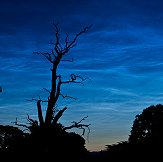
|
John
Houghton,
Leicester UK
Jul. 20, 2009 |
#1,
#2, #3 |
Fantastic
display in the early hours of the morning, possibly the
best so far. The crescent moon and venus were also in the
sky as a bonus! Taken with a Nikon D700 and Nikon 50mm f/1.4
lens, ISO 400, f/4.8 various exposure times. |
|
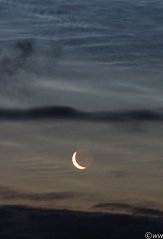
|
Martin
Mc Kenna,
Maghera, Co. Derry, N. Ireland
Jul. 20, 2009 |
#1,
#2,
#3,
#4,
more |
Hi
Tony An absolutely incredible NLC display appeared over
N. Ireland last night. It was weak in the evening however
before dawn it rose again and intensified and spread out
rapidly with vividly moving formations in real time. When
patches of trop cloud shifted I could see the slender crescent
Moon with earthshine with mighty Venus all shrouded in glowing
silver-blue NLCs. It was breathtaking!. Soon after the entire
sky was covered with just a clear band low in the S and
W. I seen struture I have never observed before in my life!
Fujifilm S6500fd 6.3MP at ISO200 various settings. |
|
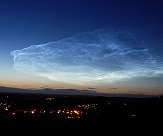
|
Peter
Vasey,
Looking North over Hexham, Northumberland, UK
Jul. 19, 2009 |
#1,
more |
I
photographed this most unusual noctilucent cloud shortly
before midnight. It was quite short lived, and puts me in
mind of a whale cruising through the sky! |
|
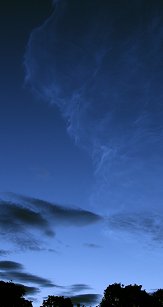
|
Alan
C Tough,
Elgin, Moray, Scotland.
Jul. 19, 2009 |
#1,
#2 |
When
I looked out of my window at 11 p.m. (local time) I could
see what looked like a weather front - of Noctilucent Clouds!
Quite incredible. This NLC season has been amazing, and
it continues to surprise. Photographic equipment used: Canon
EOS 40D and Sigma EX DG 24-60mm lens. |
|
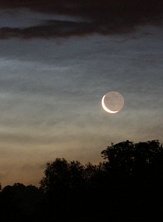
|
Richard
Fleet,
Pewsey Vale, Wiltshire, England
Jul. 20, 2009 |
#1,
#2, #3,
more |
Another
good display this morning with a crescent moon shining through
the noctilucent cloud. Low cloud obscured part of the display
but it was well worth getting up for. |
|
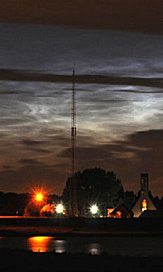
|
Jan
Koeman,
Bergse Maas, Waalwijk, The Netherlands
Jul. 19, 2009 |
#1,
more |
The
Noctilucent storm over Europe is not over yet! Around midnight
last night I took this picture of a NLC-display peering
through the rainclouds. They were clearly visible but only
a few degrees above the horizon. |
|
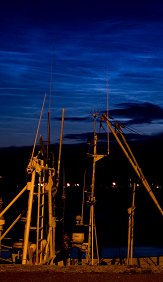
|
Peter
McCabe,
Dundalk, Co.Louth, Ireland
Jul. 20, 2009 |
#1,
#2, #3 |
The
most fantastic display yet.NLC's Venus and Moon! Started
at about 3am. NLC's filled the sky looking NW to E and rose
more than 90deg overhead. The photos don't do them justice!!!!!!
|
more
images: from
Ian Sharp of Ham, West Sussex, England, UK; from
Monika Landy-Gyebnar of Veszprem, Hungary; from
Mike Alexander of Galloway Astronomy Centre, Wigtownshire,
Scotland, UK; from
Ivan Majchrovic of Marianka, Slovakia; from
Vincent Phillips of Hale village,near Liverpool UK; from
Ágnes Őri of Jobbágyi, Hungary
|
|
|








